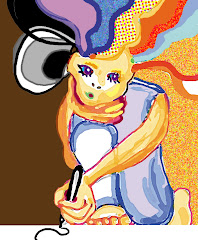After the video explanation I thought yes wikis are useful for collaboration when you cannot physically meet. Email traffic with "reply all" is the current norm but can become a bit tedious if there is a lot to discuss.
I imagine wikis very work well with factual entries rather than opinions.
Question 1. Are wiki entries trackable or given the same legal staus as emails?
Question 2. Do organisations allow their staff to use wikis as an alternative to email?
Question 3. How do you ensure that content that you want to stay 'as is' is not edited away by someone else?
I would be happy to hear your answers to these.
After looking at the wikis, I chose to bookmark Library Success and Book Lovers and Blogging Libraries Wikis for a closer look later.
Say if a librarian was interested in finding out what works and doesn't work with layout floor plan when a library is in a shopping centre, I guess that a wiki of librarians would be very helpful to garner feedback on their own experiences with layout successes and failures. This might forestall some otherwise unforeseen problems.
Informal friendly professional sharing is always welcome, and tapping into a large wiki community may be very helpful when needing advice.
Friday, April 17, 2009
Subscribe to:
Post Comments (Atom)




With some experience being a member of a collaborative wiki as a distance ed student, I can see a use for them among professional library colleagues. To complete a redraft of a Collection Development Policy for example a wiki would be useful. Library staff located across different branches could contribute/alter/add to the wiki, in their own time.
ReplyDeleteHi, I think the whole idea of wikis is that somebody else can edit your work! The only way that somebody wouldn't edit your work is if everybody agreed with it. It's the risk you take if you put it out there.
ReplyDeleteCarole